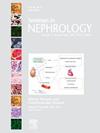如何确保血液透析中体外循环的通畅:全球视角。
IF 2.8
3区 医学
Q2 UROLOGY & NEPHROLOGY
引用次数: 0
摘要
充分了解用于防止体外循环凝血的抗凝剂对于提供最佳血液透析至关重要。药物有可能防止体外循环凝血,但用药方法、半衰期和潜在副作用各不相同。然而,目前缺乏指导抗凝和避免副作用的简明建议。由于新型抗凝剂、直接凝血酶抑制剂和肝素类药物的发展,肝素的一些副作用可能会被克服,但对这些新型药物有更深入的了解是必要的。此外,世界各地使用的肝素类型、给药途径和医疗保健经济学也不尽相同。我们广泛查阅了相关文献,本文重点介绍了现有的抗凝药物,探讨了剂量、副作用、在血液透析中的特殊用途、作用机制、药代动力学特性以及在特殊情况下的使用。传统抗凝剂仍是抗凝标准,但许多问题仍未得到解答,例如,就疗效、安全性和医疗保健经济性而言,一种治疗方法是否真的优于另一种治疗方法?需要对血液透析的抗凝方案进行标准化,并开展进一步的研究来回答所有这些问题。本文章由计算机程序翻译,如有差异,请以英文原文为准。
How to Ensure Patency of the Extracorporeal Circuit in Hemodialysis: Global Perspectives
An adequate knowledge of anticoagulants used to prevent clotting in the extracorporeal circuit is crucial to provide optimal hemodialysis. Drugs can potentially prevent extracorporeal circuit clotting, but administration, half-life, and potential side effects differ. However, there is a lack of concise recommendations to guide anticoagulation and to avoid side effects. Because of the development of newer anticoagulant agents, direct thrombin inhibitors, and heparinoids, some of the side effects related to heparin may be overcome, but a deeper knowledge of these newer drugs is necessary. Moreover, types of heparin used, routes of administration, and health care economics vary around the world. We performed an extensive review of the literature, and the present article focuses on available anticoagulant drugs, exploring doses, side effects, particular use in hemodialysis, mechanism of action, pharmacokinetic properties, and use in special situations. Classical anticoagulants are still the standard of anticoagulation, but many questions remain unanswered; for example, is there real superiority of one treatment over another in terms of efficacy, safety, and health care economics? Anticoagulant protocols for hemodialysis need to be standardized and further studies performed to answer all of these questions.
求助全文
通过发布文献求助,成功后即可免费获取论文全文。
去求助
来源期刊

Seminars in nephrology
医学-泌尿学与肾脏学
CiteScore
5.60
自引率
0.00%
发文量
27
审稿时长
6-12 weeks
期刊介绍:
Seminars in Nephrology is a timely source for the publication of new concepts and research findings relevant to the clinical practice of nephrology. Each issue is an organized compendium of practical information that serves as a lasting reference for nephrologists, internists and physicians in training.
 求助内容:
求助内容: 应助结果提醒方式:
应助结果提醒方式:


